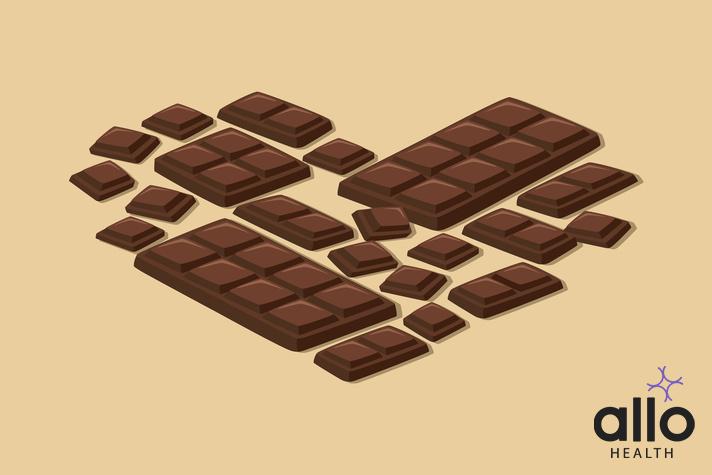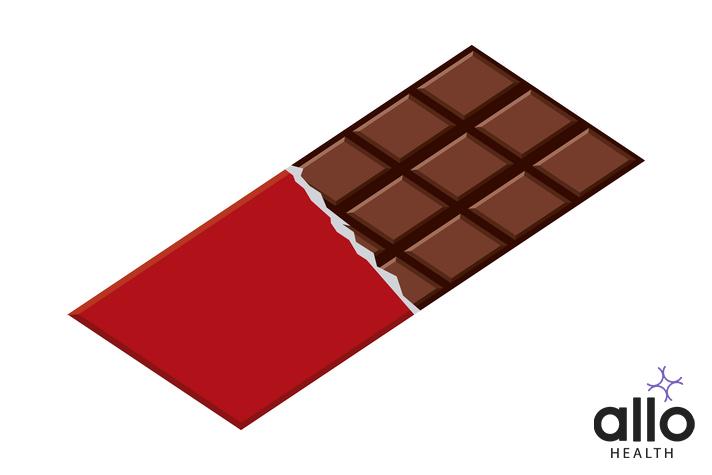Benefits Of Dark Chocolate For Sex

Allo Health is dedicated to personalized well-being, offering support and trusted information tailored to individual health goals. The platform emphasizes human-generated content, led by a distinguished medical team of experts, including physicians and sexual health specialists. Their commitment to credibility involves rigorous fact-checking, authoritative research, and continuous updates to ensure accurate, up-to-date information. Allo Health's unique approach goes beyond conventional platforms, providing expert-led insights and a continuous commitment to excellence, with user feedback playing a crucial role in shaping the platform's authoritative voice.

Dr. Warisha holds an MBBS degree from GMERS Medical College, Ahmedabad. She has an in depth experience on sexual and reproductive health and rights.
Why This Was Upated?
Our experts continually monitor the health and wellness space, and we update our articles when new information became available.
Updated on 23 December, 2023
- Article was updated as part of our commitment to diversity, equity, and inclusion.

"The following blog article provides general information and insights on various topics. However, it is important to note that the information presented is not intended as professional advice in any specific field or area. The content of this blog is for general educational and informational purposes only.
Book consultation
The content should not be interpreted as endorsement, recommendation, or guarantee of any product, service, or information mentioned. Readers are solely responsible for the decisions and actions they take based on the information provided in this blog. It is essential to exercise individual judgment, critical thinking, and personal responsibility when applying or implementing any information or suggestions discussed in the blog."
If you’re looking for an all-natural way to improve your sex life, you might be surprised to learn that dark chocolate could be the answer. Dark chocolate has been touted as a natural aphrodisiac for centuries, but in recent years, science has uncovered some compelling evidence to support its reputation.
Health Benefits Of Dark Chocolate
Dark chocolate, when consumed in moderation and as part of a balanced diet, can provide several health benefits due to its rich nutrient profile. Let’s explore the detailed health benefits of dark chocolate:
- Nutrient-Rich: Dark chocolate is packed with various essential nutrients. A 100-gram bar of dark chocolate with 70-85% cocoa solids typically contains:
- Fiber: Dark chocolate is a good source of dietary fiber, promoting healthy digestion.
- Iron, Magnesium, and Copper: These minerals are crucial for various bodily functions, including oxygen transport, energy production, and immune system support.
- Potassium: Important for maintaining proper heart and muscle function, regulating blood pressure, and supporting overall cardiovascular or heart health.
- Antioxidant Powerhouse: Dark chocolate is one of the most potent antioxidant-rich foods. Antioxidants help protect the body against free radicals, which are unstable molecules that can cause cellular damage and contribute to chronic diseases. The main types of antioxidants found in dark chocolate are:
- Flavonoids: Dark chocolate is particularly rich in flavonoids, including catechins, epicatechins, and procyanidins. These compounds have been associated with various health benefits, including reduced inflammation, improved blood flow, and reduced risk of heart disease.
- Polyphenols: Dark chocolate contains polyphenols, which are plant compounds with antioxidant properties. Polyphenols have been linked to lower blood pressure, improved blood sugar control, and reduced inflammation.
- Cardiovascular Health: Consumption of dark chocolate has been associated with several cardiovascular benefits, including:
- Improved Blood Pressure: Dark chocolate has been shown to modestly lower blood pressure, mainly due to the presence of flavonoids that promote the dilation of blood vessels, improving blood flow.
- Reduced Risk of Heart Disease: The antioxidant-rich nature of dark chocolate, along with its potential to lower blood pressure, improve blood lipid profile (such as increasing HDL cholesterol and reducing LDL oxidation), and reduce inflammation, may contribute to a lower risk of heart disease.
- Brain Health: Dark chocolate may have positive effects on brain health and cognitive function due to its antioxidant and anti-inflammatory properties. Studies have suggested the following benefits:
- Improved Cognitive Performance: The flavonoids in dark chocolate may enhance blood flow to the brain, promoting better cognitive function, attention, and memory.
- Mood Enhancement: Dark chocolate contains compounds such as phenylethylamine and anandamide, which can promote the release of endorphins and serotonin, leading to improved mood and feelings of well-being.
- Potential Neuroprotective Effects: Some research suggests that the antioxidants in dark chocolate may help protect the brain against age-related cognitive decline and neurodegenerative diseases, although more studies are needed to establish a definitive link.
- Skin Health: The antioxidants found in dark chocolate can benefit the skin by:
- Protecting against UV Damage: The flavonoids in dark chocolate may help protect the skin from harmful UV radiation, reducing the risk of sunburn and potentially preventing long-term skin damage.
- Improving Skin Hydration and Texture: Dark chocolate’s flavonoids may enhance skin hydration and improve its overall texture, making it look healthier and more youthful.
It’s important to note that while dark chocolate offers potential health benefits, it should be consumed in moderation, as it is still calorie-dense and can contribute to weight gain if consumed excessively. Opt for dark chocolate with higher cocoa content and lower added sugar for maximum health benefits.
The Science Behind Dark Chocolate’s Aphrodisiac Properties
Dark chocolate has long been associated with aphrodisiac properties, and there are scientific explanations for its potential effects on libido and sexual desire. Let’s explore the science behind dark chocolate’s aphrodisiac properties in detail.
- Chemical Composition: Dark chocolate contains several compounds that contribute to its aphrodisiac effects:
-
- Phenylethylamine (PEA): PEA is a naturally occurring compound in the brain that is released during moments of emotional euphoria, such as falling in love. Dark chocolate contains PEA, which may promote feelings of happiness and excitement.
- Tryptophan: Tryptophan is an essential amino acid that is a precursor to serotonin, a neurotransmitter involved in mood regulation. Serotonin plays a crucial role in sexual desire and satisfaction.
- Anandamide: Dark chocolate contains anandamide, often referred to as the “bliss molecule.” Anandamide binds to cannabinoid receptors in the brain, which can induce feelings of relaxation, pleasure, and even euphoria.
- Phenolic Compounds: Dark chocolate is rich in phenolic compounds, such as flavonoids and procyanidins. These compounds have antioxidant properties and can improve blood flow, leading to better overall cardiovascular health. Enhanced blood flow can be beneficial for sexual function and arousal.
- Cardiovascular Effects: Dark chocolate consumption has been linked to improved cardiovascular health, including better blood flow and lowered blood pressure. These effects can positively impact sexual function, as adequate blood flow is essential for arousal and achieving an erection (in men) or engorgement of the clitoris (in women).
- The flavonoids present in dark chocolate promote the production of nitric oxide, a molecule that relaxes and dilates blood vessels. This relaxation of blood vessels improves blood flow to various parts of the body, including the genital region, thus enhancing sexual function.
- Psychological Effects: Eating dark chocolate can also have psychological effects that contribute to its aphrodisiac properties. The pleasurable taste and indulgence associated with consuming chocolate can create a positive mood and increase feelings of desire and sensuality.
Additionally, the release of endorphins, which are natural painkillers and mood elevators, can occur when eating dark chocolate. Endorphins induce feelings of pleasure and well-being, potentially enhancing the overall experience of sexual activity.
While dark chocolate can have potential aphrodisiac properties, it is essential to consume it in moderation as part of a balanced diet. Excessive consumption can lead to weight gain and other health concerns. Opt for dark chocolate with a high percentage of cocoa (70% or more) to maximize the potential benefits while minimizing added sugar content and fats.
Benefits Of Dark Chocolate For Sex

Dark chocolate has been associated with potential benefits for sexual health and function. Let’s explore the detailed benefits of dark chocolate for sex:
- Increased Libido and Desire: Dark chocolate contains several compounds that can enhance mood and stimulate the release of feel-good hormones. These include phenylethylamine (PEA), which can promote feelings of happiness and excitement, and anandamide, known as the “bliss molecule.” These compounds may help increase libido and desire.
- Improved Blood Flow: Dark chocolate contains flavonoids that promote the production of nitric oxide, a molecule that relaxes and dilates blood vessels. This relaxation of blood vessels improves blood flow throughout the body, including to the genital region. Enhanced blood flow to the genital area can contribute to improved sexual arousal, sensitivity, and satisfaction.
- Enhanced Sexual Performance: The improved blood flow associated with dark chocolate consumption can benefit sexual performance. In men, adequate blood flow is essential for achieving and maintaining an erection. In women, enhanced blood flow to the clitoris and vaginal area can increase sensitivity and arousal. Dark chocolate’s potential to improve cardiovascular health and promote blood circulation can contribute to better sexual performance.
- Mood Enhancement and Stress Reduction: Dark chocolate contains compounds that can positively affect mood and reduce stress. Consuming dark chocolate can stimulate the release of endorphins, which are natural mood elevators and can promote a sense of pleasure and well-being. By reducing stress and anxiety, dark chocolate may help create a more relaxed and enjoyable sexual experience.
- Antioxidant and Anti-inflammatory Effects: Dark chocolate is rich in antioxidants, such as flavonoids and polyphenols, which have anti-inflammatory properties. By reducing inflammation in the body, dark chocolate may support overall health and well-being, including sexual health. Chronic inflammation can contribute to sexual dysfunction, so the anti-inflammatory effects of dark chocolate may indirectly improve sexual function.
- Emotional Connection and Sensuality: Dark chocolate’s rich flavor, pleasurable taste, and indulgent nature can create a romantic and sensual atmosphere. Sharing and enjoying dark chocolate together can foster a sense of intimacy and enhance emotional connection between partners. The act of sharing and savoring dark chocolate can add a touch of romance and playfulness to sexual encounters.
While dark chocolate may have potential benefits for sexual health, individual responses can vary. Factors such as overall health, psychological state, and personal preferences play a role in determining the effects of dark chocolate on sexual function. Additionally, the aphrodisiac effects of dark chocolate should not be relied upon as a sole solution for sexual concerns. A healthy lifestyle, open communication with your partner, and addressing any underlying concerns are equally important for a satisfying sex life.
The Nutrients in Dark Chocolate: How Much Is Too Much?
Dark chocolate is rich in nutrients, but it’s important to consume it in moderation due to its high calorie and fat content. Let’s delve into the nutrients found in dark chocolate and discuss how much is too much:
- Calories: Dark chocolate is calorie-dense. A 100-gram bar of dark chocolate with 70-85% cocoa solids can provide around 600 to 700 calories. Therefore, it’s crucial to consider portion sizes and calorie intake when incorporating dark chocolate into your diet.
- Fat: Dark chocolate contains significant amounts of fat, including saturated fat. While dark chocolate does contain some healthy fats, such as monounsaturated fats, excessive consumption can contribute to weight gain and increase the risk of cardiovascular concerns if consumed in large quantities.
- Sugar: Dark chocolate is typically lower in sugar compared to milk chocolate, but it still contains sugar. Some dark chocolate products may have added sugars for taste. High sugar intake can lead to weight gain, increased risk of diabetes, and other health concerns. It’s important to choose dark chocolate with minimal added sugars and moderate your overall sugar intake.
- Fiber: Dark chocolate can contribute to your daily fiber intake. A 100-gram bar may provide around 10-15 grams of dietary fiber, depending on the brand and cocoa content. Fiber is essential for digestive health, but consuming too much dark chocolate to meet your fiber needs can lead to excessive calorie intake.
- Minerals: Dark chocolate contains various minerals, including iron, magnesium, copper, and potassium. While these minerals are beneficial, it’s important to note that the amounts found in dark chocolate are not substantial enough to solely rely on it as a source of these nutrients. A well-rounded diet with diverse food sources is necessary to meet your mineral needs.
- Caffeine: Dark chocolate contains a small amount of caffeine. The caffeine content varies depending on the brand and cocoa percentage. While the caffeine content is generally low compared to other sources like coffee or tea, individuals who are sensitive to caffeine or trying to limit their intake should be mindful of their consumption.
How to Incorporate Dark Chocolate into Your Diet
Incorporating dark chocolate into your diet can be a delicious and enjoyable way to reap its potential health benefits. Here are some tips on how to do it in detail:
- Choose High-Quality Dark Chocolate: Opt for dark chocolate with a high percentage of cocoa solids, ideally 70% or higher. This ensures a higher concentration of beneficial compounds such as flavonoids. Look for dark chocolate without added sugars or excessive amounts of saturated fats.
- Portion Control: Dark chocolate is calorie-dense, so portion control is essential. Stick to moderate serving sizes, such as one to two small squares (about 20-30 grams) per day. Avoid mindless snacking on large quantities to prevent excessive calorie intake.
- Pair with Healthy Foods: Dark chocolate can be paired with other nutrient-rich foods to create a balanced snack or dessert. Try combining dark chocolate with fruits like strawberries, raspberries, or sliced bananas. You can also enjoy it with a handful of nuts or a serving of Greek yogurt to add protein and healthy fats to your snack.
- Use in Baking and Cooking: Dark chocolate can be used as an ingredient in various recipes to add flavor and richness. Use it in moderation when preparing homemade granola bars, muffins, or oatmeal cookies. Dark chocolate can also be melted and drizzled over fruits or added to smoothies for a touch of indulgence.
- Make Hot Chocolate: Create a healthier version of hot chocolate by using dark chocolate. Heat a cup of unsweetened almond milk or any other milk of your choice, and stir in a small piece of dark chocolate until melted. You can also add a pinch of cinnamon or a splash of vanilla extract for extra flavor.
- Enjoy Mindfully: When consuming dark chocolate, take the time to savor and appreciate the flavors. Eat it slowly and mindfully, paying attention to the taste, texture, and aroma. This can enhance your enjoyment and satisfaction from the experience.
- Be Mindful of Added Sugars: While dark chocolate itself contains some natural sugars, be mindful of products that have added sugars or sweeteners. Read the ingredient list and choose dark chocolate with minimal added sugars or opt for unsweetened varieties.
- Balance with a Healthy Diet: Remember that dark chocolate should be enjoyed as part of a balanced diet. Focus on consuming a variety of nutrient-rich foods, including fruits, vegetables, whole grains, lean proteins, and healthy fats.
The Best Types of Dark Chocolate
When selecting dark chocolate, it’s important to choose high-quality options that provide maximum health benefits and taste. Here are some factors to consider when determining the best types of dark chocolate:
- Cocoa Percentage: Look for dark chocolate with a high cocoa percentage, preferably 70% or higher. The higher the cocoa content, the more beneficial compounds like flavonoids and antioxidants it will contain. Higher cocoa content also means less added sugar and fat.
- Quality of Ingredients: Read the ingredient list to ensure that the dark chocolate you choose has minimal additives and unnecessary ingredients. Ideally, it should contain cocoa mass or cocoa solids, cocoa butter, and a small amount of sugar or natural sweeteners. Avoid dark chocolate with artificial flavors, hydrogenated oils, or excessive amounts of saturated fats.
- Organic and Fair Trade Certifications: Consider choosing organic dark chocolate made from cocoa beans that have been grown without synthetic pesticides or fertilizers. Additionally, look for fair trade certifications, which ensure that the cocoa beans are sourced from farmers who receive fair prices and fair treatment.
- Single-Origin or Bean-to-Bar: Single-origin dark chocolate is made from cocoa beans sourced from a specific region or country, allowing you to experience unique flavor profiles. Bean-to-bar chocolate makers take control of the entire chocolate-making process, from sourcing the beans to crafting the final product, resulting in higher quality and traceability.
- Flavor Profile: Different dark chocolates have distinct flavors and notes, ranging from fruity and acidic to nutty and earthy. Experiment with different brands and cocoa percentages to find the flavor profile that suits your preferences. Consider trying chocolates from different regions like Madagascar, Ecuador, or Ghana to experience their specific flavor profiles.
- Personal Preferences: Ultimately, the best type of dark chocolate depends on your personal taste preferences. Some people enjoy a more intense, bitter flavor, while others prefer a slightly sweeter dark chocolate. Explore different brands, cocoa percentages, and flavor profiles to find the dark chocolate that you enjoy the most.
Debunking Common Myths About Dark Chocolate and Sex

There are several myths and misconceptions surrounding the relationship between dark chocolate and sex. Let’s debunk some of the common myths in detail:
Myth 1: Dark Chocolate is a Natural Aphrodisiac
While dark chocolate has been associated with potential aphrodisiac properties, it is not a guaranteed aphrodisiac for everyone. The effects of dark chocolate on libido and sexual desire can vary from person to person. The aphrodisiac effects of dark chocolate are more likely due to its psychological and physiological effects, such as mood enhancement and improved blood flow, rather than any specific “magic” ingredient.
Myth 2: Dark Chocolate Can Instantly Boost Libido
While dark chocolate contains compounds that can potentially enhance mood and stimulate the release of feel-good hormones, it does not have an immediate and dramatic effect on libido. Sexual desire is a complex interplay of physical, psychological, and interpersonal factors. Dark chocolate may contribute to an overall positive mood, but it cannot single-handedly solve underlying concerns affecting libido.
Myth 3: Eating Lots of Dark Chocolate Equals Better Sexual Performance
Consuming excessive amounts of dark chocolate will not automatically result in improved sexual performance. While the flavonoids in dark chocolate can improve blood flow and cardiovascular health, they are not a substitute for a healthy lifestyle, regular exercise, and overall well-being. Sexual performance is influenced by a variety of factors, and a balanced approach to overall health is crucial.
Myth 4: Dark Chocolate Can Replace Medical Treatments for Sexual Dysfunction
Dark chocolate cannot replace medical treatments for sexual dysfunction. While it may have potential benefits for sexual health, it is not a substitute for professional medical advice or treatment. If you are experiencing sexual difficulties, it is important to consult with a healthcare professional who can provide appropriate guidance and treatment options.
Myth 5: More Dark Chocolate Means Better Results
Consuming excessive amounts of dark chocolate in the hopes of enhancing its potential benefits is not advisable. Dark chocolate is calorie-dense and can contribute to weight gain if consumed in large quantities. Moderation is key when incorporating dark chocolate into your diet, and it should be enjoyed as part of a balanced and varied nutritional plan.
Dark chocolate is a delicious and all-natural way to boost your sexual health and desire. Whether you’re looking to improve erectile function, increase sensitivity and pleasure, or simply enhance your overall sexual well-being, regular consumption of dark chocolate can offer a range of benefits. So why not indulge in a bit of dark chocolate today and discover the benefits for yourself?
We encourage you approach the relationship between dark chocolate and sex with realistic expectations. While dark chocolate can be a part of a pleasurable and enjoyable experience, its effects on sexual health should be viewed in conjunction with overall well-being, communication with your partner, and addressing any underlying concerns that may impact sexual function.
Always consult with healthcare professionals or registered dietitians for personalized advice and guidance regarding your specific dietary and sexual health concerns.






































